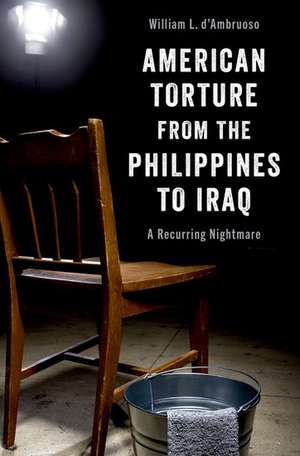American Torture from the Philippines to Iraq: A Recurring Nightmare
Autor William L. d'Ambruosoen Limba Engleză Hardback – 31 mar 2022
Preț: 282.62 lei
Nou
Puncte Express: 424
Preț estimativ în valută:
54.08€ • 56.61$ • 45.01£
54.08€ • 56.61$ • 45.01£
Carte disponibilă
Livrare economică 10-24 martie
Livrare express 21-27 februarie pentru 37.33 lei
Preluare comenzi: 021 569.72.76
Specificații
ISBN-13: 9780197570326
ISBN-10: 0197570321
Pagini: 224
Dimensiuni: 240 x 164 x 22 mm
Greutate: 0.5 kg
Editura: Oxford University Press
Colecția OUP USA
Locul publicării:New York, United States
ISBN-10: 0197570321
Pagini: 224
Dimensiuni: 240 x 164 x 22 mm
Greutate: 0.5 kg
Editura: Oxford University Press
Colecția OUP USA
Locul publicării:New York, United States
Recenzii
If torture is so ineffective as an interrogation tool, producing unreliable information while spurring opposition recruitment and losing hearts and minds, why does it persist in liberal democracies that have clearly outlawed it? In this historically rich book, William d'Ambruoso addresses this paradox by examining the US government's use of torture over a century—from the Philippine-American War through the Vietnam conflict to the post-September 11 'war on terror.' He incisively shows how the allure of the prohibited (if it's banned, it must work, right?) and the vagueness of the prohibition (what exactly is torture, anyway?) contribute to a stubborn willingness in extraordinary circumstances to deploy a horrendous tool that its architects must know is both counterproductive and antithetical to the values that they purport to uphold.
d'Ambruoso's work provides a historically rich account of the USA's use of torture from the late 1800s to the war on terror. He demonstrates the fragility of the anti-torture norm and provides a compelling argument for unequivocal definitions of torture, to help buttress the norm, and to facilitate accountability of elected officials who are responsible for upholding international human rights law, as well as the most fundamental of human rights.
A concise, engaging volume that will be a must-read for scholars of armed conflict. Tracing US reliance on torture from war in the Philippines, to Vietnam, to the contemporary war on terror, d'Ambruoso achieves a remarkable feat: a crisply stated theoretical argument that nevertheless rejects false parsimony. Examining key decision moments across three conflicts, he explains the puzzling persistence of an atrocity that both courts international opprobrium and (often) fails to achieve its ostensible goals. The conflicts d'Ambruoso foregrounds are well known, yet d'Ambruoso brings new perspectives to the comparison—a significant feat.
d'Ambruoso's work provides a historically rich account of the USA's use of torture from the late 1800s to the war on terror. He demonstrates the fragility of the anti-torture norm and provides a compelling argument for unequivocal definitions of torture, to help buttress the norm, and to facilitate accountability of elected officials who are responsible for upholding international human rights law, as well as the most fundamental of human rights.
A concise, engaging volume that will be a must-read for scholars of armed conflict. Tracing US reliance on torture from war in the Philippines, to Vietnam, to the contemporary war on terror, d'Ambruoso achieves a remarkable feat: a crisply stated theoretical argument that nevertheless rejects false parsimony. Examining key decision moments across three conflicts, he explains the puzzling persistence of an atrocity that both courts international opprobrium and (often) fails to achieve its ostensible goals. The conflicts d'Ambruoso foregrounds are well known, yet d'Ambruoso brings new perspectives to the comparison—a significant feat.
Notă biografică
William L. d'Ambruoso is a fellow with the International Security Program and the Project on Managing the Atom at the Belfer Center for Science and International Affairs in the Kennedy School of Government at Harvard University. He previously taught courses on wartime violence and international security at Bates College.
